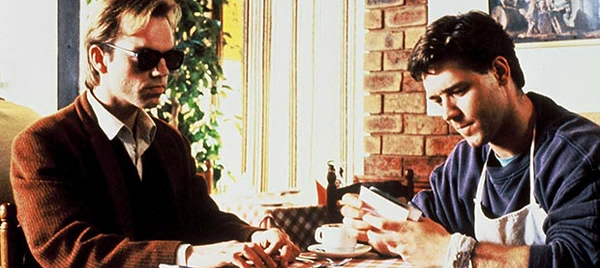You have just read a blog post written by Jason McIntosh.
If you wish, you can visit the rest of the blog, or subscribe to it via RSS. You can also find Jason on Twitter, or send him an email.
Thank you kindly for your time and attention today.
 I first saw 1991’s Proof on the little television in my first all-by-myself apartment in Bangor, Maine. I had caught it by happenstance, the way one did with movies on TV in those days. I enjoyed the unexpected treat very much. Some recent reading jogged my memory of it, and today being today I queued it up for an on-demand rewatch immediately. I hoped that I’d still like it, decades later — and I did, though for very different reasons than I remember!
I first saw 1991’s Proof on the little television in my first all-by-myself apartment in Bangor, Maine. I had caught it by happenstance, the way one did with movies on TV in those days. I enjoyed the unexpected treat very much. Some recent reading jogged my memory of it, and today being today I queued it up for an on-demand rewatch immediately. I hoped that I’d still like it, decades later — and I did, though for very different reasons than I remember!
My main recollection involves the poisonous and mutually manipulative relationship between a cranky blind photographer (Hugo Weaving) and his cruelly sardonic housekeeper (Geneviève Picot). Their bizarre relationship thrilled me, and in retrospect I see how it would inform the cartoon fiction I experimented with in my twenties, which often focused on this sort of twisted pairing. With my first experiments in dating still in the future, I probably envisioned myself in a situation like this, bound to a captivatingly horrible snake-woman.
Look, I read a lot of Updike novels during these days as well, all right? I had to work through all this.
Returning to today: I found every bit of all that still in Proof, just as I remembered it, and had fun seeing it all again. I did not expect to find that movie does not at all center on that messed-up relationship, however! Instead, it concerns the unlikely friendship that Weaving’s photographer strikes up with a kitchen worker (Russell Crowe), after rescuing his alley-cat pet from an accident. The film centers on the rapidly flowering bond between the two men, which survives various disasters and obstacles — the venomously jealous housekeeper chief among them — and ultimately lets the photographer let go of a self-punishing weight that had stunted his own emotional growth.
Proof provides an honestly simple and sweet story of friendship, trust, and growth between two adults, with just a couple of slightly larger-than-life dramatic twists for flavor. Though “buddy films” constitute a genre unto themselves, this one seems to fall outside the tropes, what with the protagonists embracing almost immediately and unhesitatingly. Furthermore, it treats the genre’s ever-present question of homoeroticism uniquely: even after bullies casually queer-bash them at a drive-in theater, the two at no point voice any kind of concern that their deep relationship — their love, as the housekeeper correctly names it, despite the lack of literal romance — is strange in any way, and neither does the movie.
My total amnesia for the film’s actual plot, versus its spicy added flavoring, reflects the appropriately half-developed priorities that my much younger self held in the realm of desired interpersonal relationships. I suppose that I can take some measure of relief that they’ve shifted enough since then to let me appreciate the whole picture.
This article was also posted to the “movies” section of Indieweb.xyz.
To share a response that links to this page from somewhere else on the web, paste its URL here.